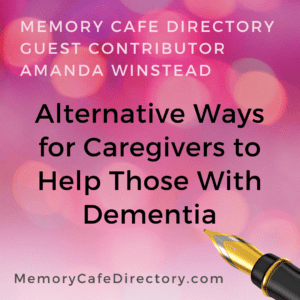Memory Cafe Directory posts and/or links to retailers can be advertising, sponsored, or affiliate links. We may earn a small commission from them. Thank you.
Alternative Ways for Caregivers to Help Those With Dementia
Submitted by Guest Contributor:
Amanda Winstead
To be a caregiver is both a privilege and a challenge, a sober responsibility and, at times, an impossibly heavy burden. This can be particularly true when the one you are caring for has dementia. If they are a close relative, a spouse, or a parent, to witness a loved one’s decline from who they once were can be a daily heartbreak. And combined with that heartbreak is all too often a sense of helplessness in the face of so few treatment options for this devastating condition.
There is, however, hope. Alternative therapies are showing great potential in helping persons with dementia. This article discusses some of the most promising alternative solutions caregivers can use to help those with dementia.
Pet Therapy
Anyone who has ever had an animal in their life knows what an emotional balm they can be, But not only are animals a tremendous source of comfort and joy, studies are increasingly proving what pet parents have always known: that animals are therapeutic.
For persons with dementia, the presence of animals can be particularly beneficial, both physically and psychologically. Dementia significantly increases patients’ risk for depression and anxiety, and animals are superstars in mitigating these issues. The mere act of petting an animal has been shown to boost mood and reduce anxiety. Patients with dementia have been shown to have improved nutrition, reduced blood pressure, and better social engagement than those who do not.
With support, patients with mild to moderate dementia may also be able to play an important role in caring for their animal companion, from feeding to grooming to walking and exercise. Not only is this a terrific way for patients to become more active, but it can also be a tremendous boost to the patient’s self-esteem, as the care recipient because a caregiver him/herself.
And it’s not difficult to understand why animals are such a special benefit for those with dementia. Animals don’t ask you to access memories that may be lost to you. Animals don’t care if you talk to them or simply sit silently with them. They are content just to be, to accept, and to love. And when the world no longer makes sense, that unconditional love and acceptance are the only things that matter.
Playing Games
When we grow up and begin “adulting,” we all too often forget about the importance of play. But there is mounting evidence that gameplay can be a powerful tool for your cognitive, psychological, and emotional well-being, no matter your age.
For persons with dementia, though, the benefits, once again, appear to be particularly significant. For instance, board games have been shown to decrease cognitive decline and depression symptoms in persons with, or at risk for developing, dementia.
But it’s not only traditional board games that have been shown to have a benefit. There is also mounting evidence that video games help improve both mood and memory in dementia patients.
The memory-boosting capacity of gaming appears to be especially strong in games that use virtual reality (VR) and augmented reality (AR) to provide gamers with an immersive experience, which, in turn, activates and stimulates larger and more diverse regions of the brain.
Similarly, studies have shown that gaming apps can help adults and children alike in developing essential cognitive skills, including using creative problem solving to conquer online strategy games.
At the same time, these gaming apps have also been shown to provide players of all ages with important psychosocial benefits. Online games have been used to help at-risk persons manage and mitigate depression, loneliness, and anxiety, both through the rewards of gaming itself and through the social connections that often arise through online gaming.
Many online gaming apps, for instance, allow gamers to compete with others, not only against the game itself, and that enables users to communicate and connect with fellow players from around the world, which can be a profound pleasure for those who may at times feel lost and isolated in their illness.
Music of the Heart
They say that music (unlimited on Amazon) hath the power to soothe the savage breast, but it also has the power to quiet a troubled heart and calm a confused mind. Music can be an immensely important tool for improving the overall quality of life for persons with dementia because the individual’s ability to emotionally respond to and connect with music is unaffected by the disease.
Research shows, for example, that a person’s unique musical preferences are unaffected by dementia. And the emotional resonances that music automatically elicits can help to restore a comforting sense of familiarity and recognition for those to whom reality has become strange and disconcerting.
But the benefits of music aren’t just limited to passive listening. Persons with dementia can also benefit from music therapy, where they are given the chance to make music of their own. Even the opportunity to participate in singing familiar and favorite songs has been shown to improve cognitive functioning, as singing requires both rhythm and memory recall.
Getting Social
Social isolation is perhaps one of the greatest risk factors in dementia progression, and this has led to devastating consequences for large segments of the senior population in the wake of the COVD-19 outbreak.
However, socialization is essential for slowing cognitive decline in persons with dementia. Having regular interactions with other people is enormously stimulating to the brain. It calls on the brain to process massive amounts of input from the sensory environment and respond to them appropriately. Social engagement, in other words, draws on skills of self-regulation, memory, and language and communication, to name only a few.
Beyond the cognitive benefits of socialization, though, are the emotional and psychological attributes. As we’ve seen, depression, loneliness, and anxiety are significant risk factors for persons with dementia. But time spent with friends and loved ones has a powerful mediating effect, however, providing patients with a sense of comfort, belonging, and simple “normalcy.”
The Takeaway
Caring for someone with dementia is at once an honor, a challenge, and, at times, a heartache. However, there are alternative strategies that are showing tremendous promise in helping dementia patients, whether this comes from the love of an animal, the comfort of being surrounded by friends, or simply the good times and great feelings borne of music and games.
Amanda Winstead

Amanda Winstead
Amanda is a writer from the Portland, Oregon area with a background in communications and a passion for telling stories.
Along with writing, she enjoys traveling, reading, working out, and going to concerts. If you want to follow her writing journey, or even just say hi you can find her on Twitter.
Become a Contributor!
 Do you want to be a Memory Cafe Directory contributor? If you have helpful information to share with our community, read about the guidelines, then get in touch to discuss what you have to offer.
Do you want to be a Memory Cafe Directory contributor? If you have helpful information to share with our community, read about the guidelines, then get in touch to discuss what you have to offer.
Thank you.







